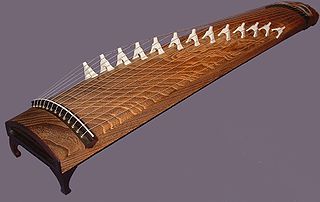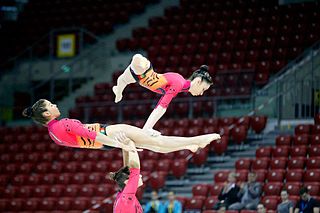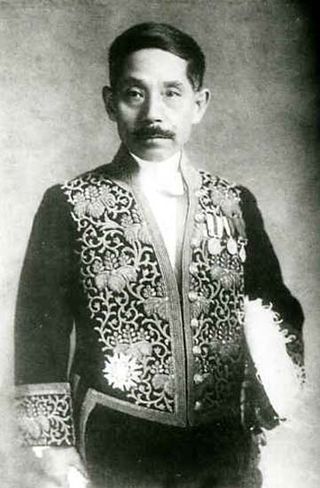
The koto is a Japanese plucked half-tube zither instrument, and the national instrument of Japan. It is derived from the Chinese zheng and se, and similar to the Mongolian yatga, the Korean gayageum and ajaeng, the Vietnamese đàn tranh, the Sundanese kacapi and the Kazakh jetigen. Koto are roughly 180 centimetres (71 in) in length, and made from Paulownia wood. The most common type uses 13 strings strung over movable bridges used for tuning, different pieces possibly requiring different tuning. Seventeen-string koto are also common, and act as bass in ensembles. Koto strings are generally plucked using three fingerpicks, worn on the first three fingers of the right hand.

Fukuoka is the sixth-largest city in Japan and the capital city of Fukuoka Prefecture, Japan. The city is built along the shores of Hakata Bay, and has been a center of international commerce since ancient times. The area has long been considered the gateway to the country, as it is the nearest point among Japan's main islands to the Asian mainland. Although humans occupied the area since the Jomon period, some of the earliest settlers of the Yayoi period arrived in the Fukuoka area. The city rose to prominence during the Yamato period. Because of the cross-cultural exposure, and the relatively great distance from the social and political centers of Kyoto, Osaka, and later, Edo (Tokyo), Fukuoka gained a distinctive local culture and dialect that has persisted to the present.

Fukuoka Prefecture is a prefecture of Japan located on the island of Kyūshū. Fukuoka Prefecture has a population of 5,109,323 and has a geographic area of 4,986 km2. Fukuoka Prefecture borders Saga Prefecture to the southwest, Kumamoto Prefecture to the south, and Ōita Prefecture to the southeast.

Indonesia is a country with many different tribes and ethnic groups, and its music is also very diverse, coming in hundreds of different forms and styles. Every region has its own culture and art, and as a result traditional music from area to area also uniquely differs from one another. For example, each traditional music are often accompanied by their very own dance and theatre. Contemporary music scene have also been heavily shaped by various foreign influences, such as America, Britain, Japan, Korea, and India.

The steelpan is a musical instrument originating in Trinidad and Tobago. Steelpan musicians are called pannists.
Music of Kazakhstan refers to a wide range of musical styles and genres deriving from Kazakhstan. Kazakhstan is home to the Kazakh State Kurmangazy Orchestra of Folk Instruments, the Kazakh State Philharmonic Orchestra, the Kazakh National Opera and the Kazakh State Chamber Orchestra. The folk instrument orchestra was named after Kurmangazy Sagyrbayuly, a well-known composer and dombra player from the 19th century.

Avispa Fukuoka is a Japanese professional football club based in Hakata, Fukuoka. They currently compete in the J1 League, which is the top tier of football in the country.

An indoor percussion ensemble or indoor drumline is a type of marching ensemble consisting of battery and front ensemble instruments. It differs itself from a traditional percussion ensemble by not only on musical performance, but on theatrics and marching. Although most indoor percussion ensembles are affiliated with high schools, there are also many independent groups that draw participants from a large area and are independently funded. Independent groups typically start rehearsing in October, while high school groups typically start after their fall marching band season ends. Because of this, the activity is often called winter percussion or winterline.
Japan Rugby League One is a rugby union competition in Japan. It is the highest level of professional rugby competition in the country. The Japan Rugby Football Union created the competition in 2003, by absorbing the Japan Company Rugby Football Championship. The chief architect of the league was Hiroaki Shukuzawa who strongly felt the urgency of improving Japanese domestic company rugby to a professional level which would allow Japan to compete more convincingly at Rugby World Cups.
Midem is the acronym for Marché International du Disque et de l'Édition Musicale, which is organised annually in and around the Palais des Festivals et des Congrès in Cannes, France. The trade show, organized by Reed MIDEM, a subsidiary of Reed Exhibitions, is billed as the leading international business event for the music ecosystem and has been held since 1967. Several thousand musicians, producers, agents, managers, lawyers, executives, entrepreneurs and journalists from around the globe regularly attend the event, which is usually held at the end of January or early February. While delegates from recording, artist management, and publishers network, new artists showcase their material. Also live music is on show in the evenings.

The Fukuoka International Marathon is an IAAF Gold Label international men's marathon race held in Fukuoka, Japan. It was previously known as the Fukuoka International Open Marathon Championship between 1947 and 2021, when it was announced the race would be discontinued on its 75th edition. However, due to popular support, a successor race, inheriting the tradition and course of the original marathon, was established the next year.

Hunter High School is a public high school located at 4200 South 5600 West, West Valley City, Utah, United States. It was opened in 1990 with its first graduating class graduating in 1991. During the first school year (1990–1991), the enrollment was below capacity, largely because seniors and juniors were allowed to choose whether to come to Hunter or complete their high school education at their current schools. The school celebrated its 25th anniversary at the end of the 2014–2015 school year.
Kemal Gekić is a Croatian-born American concert pianist and Full Professor of Piano Performance at Florida International University in Miami, Florida, USA.

A brass band is a musical ensemble generally consisting primarily of brass instruments, most often with a percussion section. Ensembles that include brass and woodwind instruments can in certain traditions also be termed brass bands, but may be more correctly termed military bands, concert bands, or "brass and reed" bands.

Kitakyushu is a city located in Fukuoka Prefecture, Japan. As of June 1, 2019, Kitakyushu has an estimated population of 940,978, making it the second-largest city in both Fukuoka Prefecture and the island of Kyushu after the city of Fukuoka. It is one of Japan's 20 designated cities, one of three on Kyushu, and is divided into seven wards.
A figure skating competition is a judged sports competition in figure skating.

Acrobatic gymnastics is a competitive discipline of gymnastics where partnerships of gymnasts work together and perform figures consisting of acrobatic moves, dance and tumbling, set to music. There are three types of routines; a 'balance' routine where the focus is on strength, poise and flexibility; a 'dynamic' routine which includes throws, somersaults and catches, and a 'combined' routine which includes elements from both balance and dynamic.

Inokichi Kubo was a Japanese pioneer of otorhinolaryngology and professor at Fukuoka Medical School.
Kim Kyung-jun is a South Korean violinist.

The Hakata Dontaku (博多どんたく) is a traditional festival held annually in Fukuoka, Japan, with more than 840 years of history. It has become an important part of the lives of Fukuoka's citizens and is one of the three major festivals in Fukuoka. Following the opening night event of 2 May, a 1.2 km stretch of Meiji-dori, one of Fukuoka's busiest thoroughfares, is closed to vehicles and transformed into "Dontaku Street".













